高中英语语法形容词和副词
高中英语语法系列――形容词和副词

高中英语语法系列――形容词和副词[知识梳理]一、形容词的概念与用法形容词(adjective)用以修饰名词,表示人或事物的特征。
它可在句中充当定语,修饰名词、代词;可以作表语或宾(主)语的补足语,表示主语或宾语的状态、特征;有时也可以作状语。
如:This is a beautiful school.这是一所美丽的学校。
(作定语,修饰名词school)I have something important to tell you.我有些重要的事要告诉你们。
(作定语,修饰不定代词something)Our school is beautiful.我们学校很美丽。
(作表语)We’ll make our school more beautiful.我们要使我们的学校更美丽。
(作宾补)Our school will be made more beautiful.我们的学校将会变得更美丽。
(作主补)He got home late that night, hungry and tired.那天晚上他很迟才回来,又累又饿。
(作状语)二、副词的概念与用法副词(adverb)用以修饰动词、形容词或其它副词。
它在句中主要作状语,个别副词也可作表语、定语、或宾(主)语补足语。
He studies hard.他学习很努力。
(作状语,修饰动词)I’m terribly sorry for being late. 非常抱歉,我迟到了。
(作状语,修饰形容词)This coat fits him very well.这件上衣他穿着很合适。
(作状语,修饰副词)The people here are kind to us.这里的人对我们很好。
(作定语,修饰The people)When will you be back? 你什么时候回来?(作表语)三、形容词与副词的转换有的形容词加上ly后可转换成副词,规则如下:注意:friendly, motherly, lovely等词虽然以ly结尾,但不是副词,而是形容词。
高中英语语法—形容词、副词

例题
1) Tony is going camping with ___ boys. A. little two other B. two little other C. two other little D. little other two
答案点拨:C 由"限定词--数词--描绘词--(大小,长短,形状,新 旧,颜色) --性质--名词"的公式可知数词,描绘词,性质依次顺序 只有C符合答案。
2、+ed
excite—excited worry—worried surprise—surprised close—closed interest—interested frighten—frightened
3、+ing
interest—interesting excite—exciting surprise—surprising follow—following
4、+y 所有表示天气状况的的形容词
sun—sunny snow—snowy wind—windy rain-rainy cloud—cloudy health—healthy
5、+ en
wool-woolen wood--wooden
6、+ern (东西南北)
east--eastern south-southern west--western north--northern
多个形容词做定语时的排列顺序:
在不确定的时候,可参照如下口诀: 美小圆旧黄,法国木书房 注释:美——描述性质;小——大小、长短、 高矮胖瘦 旧——新旧、年龄 圆——形状;黄——颜色;法国——产地、 国籍;木——材料;书房——用途 a new red silk cap一顶红色新丝帽 a short young Japanese businessman
2025届高考英语语法总复习形容词副词课件

however然而,otherwise否则,though尽管,yet虽然,instead相 反 besides而且,moreover而且,still还是,furthermore而且
表结果
therefore因此,thus因而
表让步
anyway不管怎样,无论如何
George didn’t study law.Instead,he decided to become an actor.
friend朋友→friendly友好的;time时间→timely 名词/动词
有……特征的 及时的;day一天→daily日常的;love爱→lovely
构成 意义
例词
end终止→endless无穷无尽的;aim目标→aimless无目 名词/动词 没有……
标的;home家→homeless无家可归的;use使用 +-less 的
形容词有时也作状语,通常说明主语的情况,主要表示原因、 结果、伴随、时间、条件或方式,可位于句首、句中或句末, 一般用逗号将其与其余部分隔开。
Hot and wet,you couldn’t imagine the climate here in summer.
又热又潮湿,你根本无法想象这儿的夏天(形容词作状语,表示原因)
……的 →comfortable舒适的;admire钦佩→admirable
able
可钦佩的
attract吸引→attractive有吸引力的;create创造 名词/动词
有……性质的 →creative创造性的;expense花费→expensive +-ive
昂贵的;effect效应→effective有效的
比较级、最高级的变化规则分为规则变化和不规则变化
高中英语语法复习之形容词副词
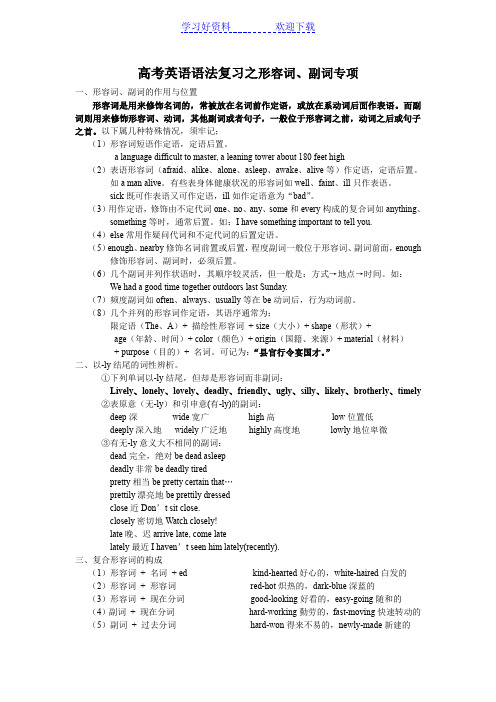
高考英语语法复习之形容词、副词专项一、形容词、副词的作用与位置形容词是用来修饰名词的,常被放在名词前作定语,或放在系动词后面作表语。
而副词则用来修饰形容词、动词,其他副词或者句子,一般位于形容词之前,动词之后或句子之首。
以下属几种特殊情况,须牢记;(1)形容词短语作定语,定语后置。
a language difficult to master, a leaning tower about 180 feet high(2)表语形容词(afraid、alike、alone、asleep、awake、alive等)作定语,定语后置。
如a man alive。
有些表身体健康状况的形容词如well、faint、ill只作表语。
sick既可作表语又可作定语,ill如作定语意为“bad”。
(3)用作定语,修饰由不定代词one、no、any、some和every构成的复合词如anything、something等时,通常后置。
如:I have something important to tell you.(4)else常用作疑问代词和不定代词的后置定语。
(5)enough、nearby修饰名词前置或后置,程度副词一般位于形容词、副词前面,enough 修饰形容词、副词时,必须后置。
(6)几个副词并列作状语时,其顺序较灵活,但一般是:方式→地点→时间。
如:We had a good time together outdoors last Sunday.(7)频度副词如often、always、usually等在be动词后,行为动词前。
(8)几个并列的形容词作定语,其语序通常为:限定语(The、A)+ 描绘性形容词+ size(大小)+ shape(形状)+age(年龄、时间)+ color(颜色)+ origin(国籍、来源)+ material(材料)+ purpose(目的)+ 名词。
可记为:“县官行令宴国才。
高中英语语法形容词和副词

2. 几种变化形式: as much + 不可数名词 + as There is as much water in this bottle as in that one. as many +可数名词复数 + as
Bob has read as many books as Mary.
as + 形容词 + 不定冠词 + 可数名词单数 + as German is as difficult a language as Chinese. as + 形容词 + 不可数名词 + as Bread is as important food as rice.
4. 作状语
It’s raining heavily.
It’s a rather interesting job.
This is just what I said.
Eventually he arrived in Beijing.
注意:1. 有些副词有两种形式,一种与形容词同形,一 种以ly结尾,但它们的含义不同。 The station is quite near. He lives near.
后置定语: 少数以a开头的形容词(absent, alike, alive, available) 及 其他形容词(concerned, present) 作定语时后置。 He made full use of English reference books available and learned a lot. People concerned will attend the meeting.
“as+形容词+(a/an)+名词+as”表示同级比较,注 意中间的形容词和名词并列时各自所在的位置。 It is generally believed that teaching is as much an art as it is a science.
高中英语:形容词与副词语法知识点

高中英语:形容词与副词语法知识点一、形容词、副词的等级(一)形容词/副词的比较级和最高级构成1.规则形容词级的构成大多数形容词、副词有三种形式: 原级、比较级和最高级。
原级用形容词/副词的原形。
它们的比较级和最高级规则变化如下表:2.不规则形容词的级的构成3.形容词、副词递减的比较等级的构成在形容词、副词前加less和least,表示“较不”和“最不”interesting有趣的 less interesting较无趣的 least interesting最无趣的important重要的 less important较不重要的 least important最不重要的有些形容詞可以加er及est或前面加上more / most來形成比較級和最高級polite –politer 或more polite –politest 或most polite ,这类词还有quiet,handsome,pleasant,common,exact.注意:下列双音节词比较级和最高级加er;est(1).无规律,死记住的词cruel,pleasant quiet civil exact stupid commom,dismal(阴沉的,忧郁的), devine(梦幻的) antique(古老的) grotesque(怪诞的)(2)-le以le为结尾的词idle,feeble, senile(衰老的), agile(灵巧的), nimble(灵活的,敏捷的). Humble(谦虚的,简陋的). Suble(阴暗的,貂皮的), able. Supple(柔顺的,灵活的).gentle.noble.. (3)-y以y为结尾的词lucky happy misty stormy,kingly, naughty, angry timely lively,healthy, heavy,busy,beastly...heavy,busy(4)重音在第二音节上chinese remote afraid alone alike apart polite severe intense obscureprofound(5)-er以ER为结尾的词tender sober clever bitter(6)-owyellow narrow shallow(浅的,表面的) hollow4.没有比较级和最高级的形容词、副词有些形容词由于其本身涵义一般不用来比较。
高中英语语法之形容词和副词
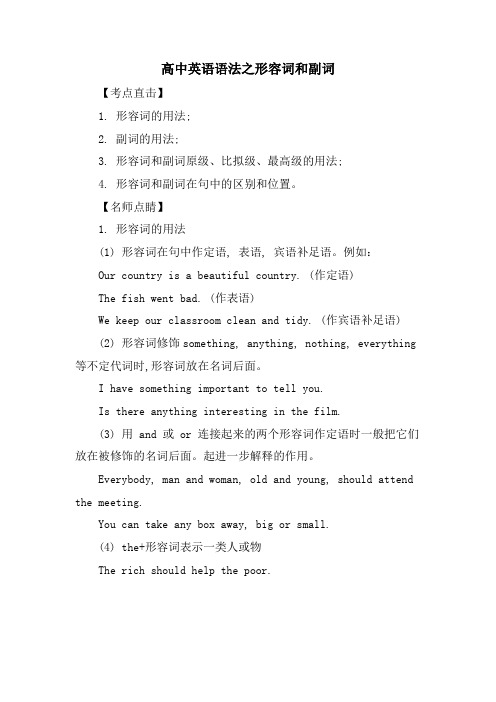
高中英语语法之形容词和副词
【考点直击】
1. 形容词的用法;
2. 副词的用法;
3. 形容词和副词原级、比拟级、最高级的用法;
4. 形容词和副词在句中的区别和位置。
【名师点睛】
1. 形容词的用法
(1) 形容词在句中作定语, 表语, 宾语补足语。
例如:
Our country is a beautiful country. (作定语)
The fish went bad. (作表语)
We keep our classroom clean and tidy. (作宾语补足语)
(2) 形容词修饰something, anything, nothing, everything 等不定代词时,形容词放在名词后面。
I have something important to tell you.
Is there anything interesting in the film.
(3) 用 and 或 or 连接起来的两个形容词作定语时一般把它们放在被修饰的名词后面。
起进一步解释的作用。
Everybody, man and woman, old and young, should attend the meeting.
You can take any box away, big or small.
(4) the+形容词表示一类人或物
The rich should help the poor.。
高中英语语法形容词和副词

形容词和副词I 形容词及其基本用法形容词修饰名词,说明事物或人的性质或特征。
1.直接说明事物的性质或特征的形容词是性质形容词,它有级的变化,可以用程度副词修饰,在句中可作定语、表语和补语。
例如:hot,happy ,等。
2.叙述形容词只能作表语,所以又称为表语形容词。
这类形容词没有级的变化,也不可用程度副词修饰。
大多数以a-开头的形容词都属于这一类。
例如:afraid害怕的。
[误]She is afraid girl.[正]The girl is afraid.这类词还有: afraid,alike,alive,alone,asleep,awake 以及well,unwell,ill, faint,等。
3.形容词作定语修饰名词时,要放在名词的前边。
但是如果形容词修饰以-thing为词尾的不定代词时,要放在这些词之后。
例如:something nice.4.以1y结尾的形容词(1)大部分形容词加-1y后可构成副词。
注意:friendly,deadly,lovely,lonely,likely,lively,brotherly等是形容词。
【误】He spoke to me very friendly.[正]He spoke to me in a very friendly way.(2)有些以-1y结尾的词既为形容词,也可为副词,如daily,weekly,monthly,yearly,early等。
例如:China Daily is a daily newspaper.《中国日报》是一份日报。
China Daily is published daily.《中国日报》每天出版。
5.用形容词表示类别和整体(1)某些形容词加上定冠词可以指一类人,与复数谓语动词连用,如the dead,the living,the rich,the poor, the blind.the hungry等。
例如:The poor are losing hope.穷人将失去希望。
高三英语高考语法知识点归纳总结形容词和副词

用比较级来表达最高级的意思
我从来没有度过这样令人烦恼的一天。 (意为:我度过了最为令人烦恼的一天。 )
表达法一: A is three(four, etc.)times the size(height,
length etc.)of B. The new building is four times the size(the height)of the old one. 这座新楼是那座旧楼的四倍大(高) / 这座新楼比那 座旧楼大(高)三倍。 表达法二: A is three(four, etc.)times as big(high, long,
perfect, superior,junior 等
twice 或 double. 注意: 1. 可以修饰比较级的词有: much, many, a lot, even, far, a bit, a little, still, yet, by far, any,
a great deal;
2. 表示“最高程度“的形容词没有最高级和比较级。如:
favourite, excellent, extreme,
only 修饰的名词之后
the best book available, the only solution possible
alive, alike, awake, aware, asleep 等作定语时后 3
置
the only person awake
4 和空间、时间、单位连用时 5 成对的形容词可以后置
a bridge 50 meters long a huge room simple and beautiful
6 形容词短语一般后置
a man difficult to get on with
高中英语语法知识:形容词和副词
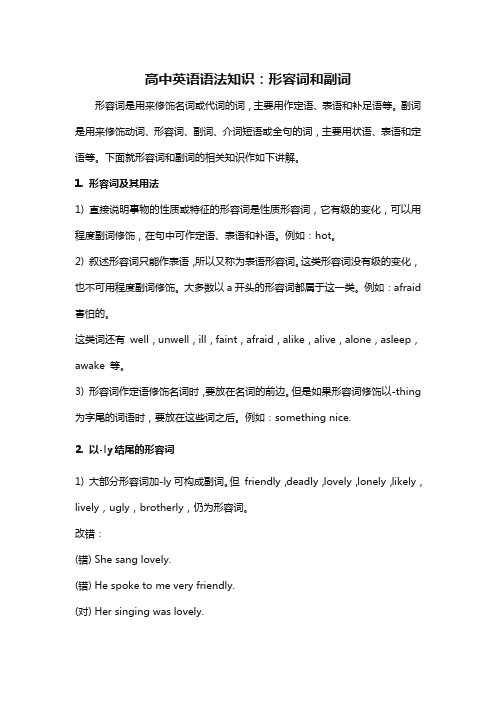
高中英语语法知识:形容词和副词形容词是用来修饰名词或代词的词,主要用作定语、表语和补足语等。
副词是用来修饰动词、形容词、副词、介词短语或全句的词,主要用状语、表语和定语等。
下面就形容词和副词的相关知识作如下讲解。
1. 形容词及其用法1) 直接说明事物的性质或特征的形容词是性质形容词,它有级的变化,可以用程度副词修饰,在句中可作定语、表语和补语。
例如:hot。
2) 叙述形容词只能作表语,所以又称为表语形容词。
这类形容词没有级的变化,也不可用程度副词修饰。
大多数以a开头的形容词都属于这一类。
例如:afraid 害怕的。
这类词还有well,unwell,ill,faint,afraid,alike,alive,alone,asleep,awake 等。
3) 形容词作定语修饰名词时,要放在名词的前边。
但是如果形容词修饰以-thing 为字尾的词语时,要放在这些词之后。
例如:something nice.2. 以-ly结尾的形容词1) 大部分形容词加-ly可构成副词。
但friendly,deadly,lovely,lonely,likely,lively,ugly,brotherly,仍为形容词。
改错:(错) She sang lovely.(错) He spoke to me very friendly.(对) Her singing was lovely.(对) He spoke to me in a very friendly way.2) 有些以-ly 结尾既为形容词,也为副词,如daily,weekly,monthly,yearly,early等。
例如:The Times is a weekly paper. 《时代周刊》为周刊。
The Times is published weekly. 《时代周刊》每周发行一期。
3. 用形容词表示类别和整体1) 某些形容词加上定冠词可以泛指一类人,与谓语动词的复数连接,如the dead,the living,the rich,the poor,the blind,the hungry等。
高中英语语法:形容词和副词(共61张PPT)

一、形容词和副词的句法功能
1.作定语 形容词作定语一般位于被修饰词的前面;副词作定语多表示时间 或地点,位于被修饰词的后面。 Widespread poverty in Africa means that many people there cannot get the water, clothing, housing, electricity, or education they need.非 洲普遍的贫穷意味着那里的许多人不能获得他们需要的饮用水、 衣服、房屋、电力及教育。 The people there were friendly.那儿的人很友好。(副词作定语须 后置)
the English英国人
(2)“the+形容词”表示抽象概念,作主语时谓语动词用单数。
the best最好的情况
the unknown未知的事
the impossible不可能的事
the right正确的事
二、形容词和副词的位置
1.形容词的位置 (1)一般情况下,单个形容词都位于所修饰的名词前。
一二、介 形词 容的 词分 和类副词的位置
(3)形容词也可位于被修饰名词之后。
③两个意义相近或相反的形容词用and, or或but连接,作定语时须后 置。 Power stations, large or small, have been set up all over the country.大大 小小的发电站已经在全国建立起来了。 All the people on this island, young or old, are fond of music.这个岛上的 老老少少都喜欢音乐。(意义相反。) ④当“形容词+不定式”构成的短语作定语时。 A man so difficult to please must be hard to work with.一个如此难以取悦 的人一定很难共事。 He enjoys the music pleasant to listen to.他很喜欢这首听起来很好听的 音乐。
高中英语2025届高考语法复习形容词与副词知识讲解
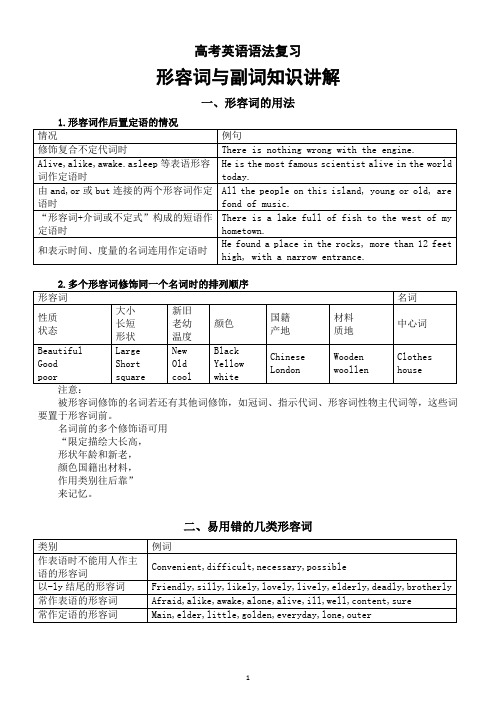
高考英语语法复习
形容词与副词知识讲解
一、形容词的用法
被形容词修饰的名词若还有其他词修饰,如冠词、指示代词、形容词性物主代词等,这些词要置于形容词前。
名词前的多个修饰语可用
“限定描绘大长高,
形状年龄和新老,
颜色国籍出材料,
作用类别往后靠”
来记忆。
二、易用错的几类形容词
三、形容词的比较等级
English is as interesting a subject as Chinese.
Which is the better of the two watches?
She is the taller of the two girls.
other或else把主语排除在比较对象之外;但如果不在同一范围比较则不需要用。
Susan is taller than any girl in her sister’s class.
四、副词的句法功能
五、副词的位置
六、副词比较等级的用法。
高中英语高考语法复习形容词与副词

高考英语形容词与副词一、形容词01 形容词的句法功能02 形容词的位置形容词作定语时一般置于被修饰词前作前置定语,下列情况中形容词通常后置于被修饰词。
(1)修饰something,anybody,nobody,anything等复合不定代词时There is nothing wrong with the machine.(机器什么问题都没有。
)(2)形容词词组作定语时She bought a book suitable for children.(她买了本适合孩子们的图书。
)(3)修饰表示数量的词要后置The baby is only five months old.(这个婴儿仅有五个月大。
)(4)enough作形容词修饰名词时,一般放在名词之前,也可放在名词之后We don't bring enough money.(我们没带够钱。
)There‘ll be time enough to relax when you’ve finished your work.(你完成工作后会有足够的时间来放松。
)[注]形容词常见于定语位置和表语位置,以上只列出几种常见情况讲解。
具体位置要视具体形容词及句子而定。
03 多个形容词修饰名词时的语序按以下顺序排列:(1)限定词(a/an,the,this,his,first,one...)(2)表示特征或性质等描述性形容词(good,pretty...)(3)表示大小、长短、高低的形容词(big,long,little...)(4)表示形状的形容词(round,square...)(5)表示年龄、新旧的形容词(old,young,new...)(6)表示颜色的形容词(red,yellow...)(7)表示国籍、地区、出处的形容词(America,southern,Italian...)(8)表示物质材料的形容词(wooden,woollen,glass...)(9)表示用途、类别的形容词(medical,writing...)a beautiful large green Chinese carpet一块漂亮宽大的绿色的中国地毯the first three days 头三天enormous black iron gates 巨大的黑色铁门04 形容词的特殊用法二、副词01 副词的种类根据词义可分为:(1)时间副词yesterday(昨天),today(今天),now(现在)等。
高中英语语法 (形容词、副词篇)
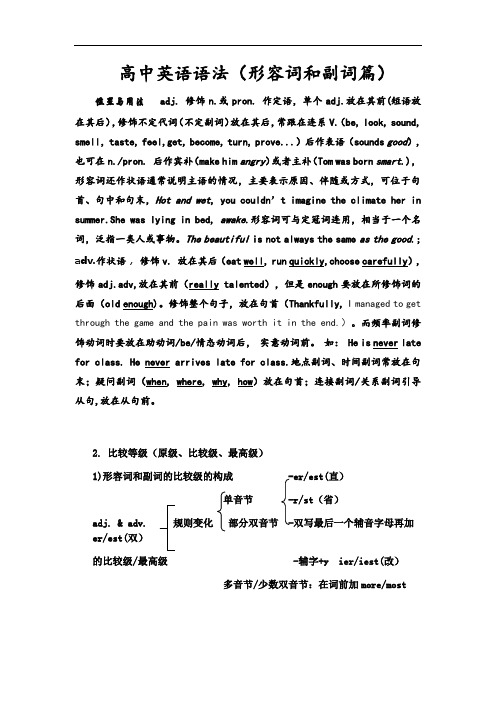
高中英语语法(形容词和副词篇)位置与用法adj. 修饰n.或pron. 作定语,单个adj.放在其前(短语放在其后),修饰不定代词(不定副词)放在其后,常跟在连系V.(be, look, sound, smell,taste, feel,get, become, turn, prove...)后作表语(sounds good),也可在n./pron. 后作宾补(make him angry)或者主补(Tom was born smart.),形容词还作状语通常说明主语的情况,主要表示原因、伴随或方式,可位于句首、句中和句末,Hot and wet, you couldn’t imagine the climate her in summer.She was lying in bed, awake.形容词可与定冠词连用,相当于一个名词,泛指一类人或事物。
The beautiful is not always the same as the good.; adv.作状语,修饰v. 放在其后(eat well, run quickly,choose carefully),修饰adj.adv,放在其前(really talented),但是enough要放在所修饰词的后面(old enough)。
修饰整个句子,放在句首(Thankfully, I managed to get through the game and the pain was worth it in the end.)。
而频率副词修饰动词时要放在助动词/be/情态动词后,实意动词前。
如: He is never late for class. He never arrives late for class.地点副词、时间副词常放在句末;疑问副词(when, where, why, how)放在句首;连接副词/关系副词引导从句,放在从句前。
- 1、下载文档前请自行甄别文档内容的完整性,平台不提供额外的编辑、内容补充、找答案等附加服务。
- 2、"仅部分预览"的文档,不可在线预览部分如存在完整性等问题,可反馈申请退款(可完整预览的文档不适用该条件!)。
- 3、如文档侵犯您的权益,请联系客服反馈,我们会尽快为您处理(人工客服工作时间:9:00-18:30)。
形容词一般放在被修饰的名词前面作定语,但考生特别要注 意形容词放在被修饰词后面的情况: (1)这些形容词,如:alive,afraid,awake,alone,asleep, worth等作定语时,常放于被修饰词的后面。
The baby still asleep might be awake very soon. 仍在睡着的那婴儿可能很快会醒。
6) 疑问副词:when,where,why,how 等,引导特殊疑 问句; 7) 连接副词:where,when,why,how 等,引导主语从 句、宾语从句或表语从句; 8) 关系副词:when,where,why 等,引导定语从句; 9) 其他副词:seriously,instead,besides 等。
(2)形容词在修饰somebody,something,anybody, anything,nobody,nothing等不定代词时,需要后置。 —Is there anything wrong,Bob?You look sad. ——鲍勃,有什么不对吗?你看上去闷闷不乐的。 —Oh,nothing much. In fact,I was just thinking of my friends. ——噢,没什么,其实我只是在想念我的朋友。
副词的种类 1) 时间副词:now,then,today,later,recently 等; 2) 地点副词:here,there,everywhere,away,off 等; 3) 方式副词:well,hard, happily, nervously, carefully 等; 4) 程度副词:almost,much,(a) little,nearly,rather, too 等; 5) 频 度 副 词 : always , often , usually , occasionally , sometimes, hardly,seldom,never 等;
2. 作表语 We are hungry. He looks unhappy. 注意: 有的形容词一般只能作表语。 如表示健康状况的:well, unwell, ill, faint 以a开头的:afraid, alone, asleep, ashamed 3. 作宾语补足语 I think the book interesting. He found the表示伴随或结果,并不表达动作的方式。 (2008·北京高考)After a long journey,the three of them got back home,hungry and tired. 经过长时间旅行后,他们三人回到了家,又饿又累。 He lay in bed,wide awake. He went to bed, cold and hungry. Funny, he pretends to know what he doesn’t know.
二、副词的语法功能
1.作定语 Almost everyone has a car in America. The building there looks grand. 2. 作表语 Time is up. I thought I was over. 3. 作宾语补足语 I am very happy to see you back. Keep the light on if you feel afraid.
后置定语: 少数以a开头的形容词(absent, alike, alive, available) 及 其他形容词(concerned, present) 作定语时后置。 He made full use of English reference books available and learned a lot. People concerned will attend the meeting. 由and, or, both…and连接的并列形容词成对使用时。 Everyone, old or young, will take part in the activities.
(3)形容词后面有介词短语时,必须放在名词后面。 He is a student worthy of praise. 他是个值得表扬的学生。
(4)形容词后面有动词不定式时,必须放在名词后面。 Isn’t it a problem difficult to solve? 这难道不是一个很难解决的问题吗?
高中英语语法形容词和副词
一、形容词的语法功能 1.作定语 前置定语: a beautiful picture
an honest boy 多个形容词作前置定语时的排列顺序: 限定词+数量形容词+描绘性形容词+大小、长短、高低等形 体形容词+新旧+颜色+国籍+材料+用途+被修饰的名词 the pretty little oldest Chinese stone bridge ten strong black plastic bags
4. 作状语 It’s raining heavily. It’s a rather interesting job. This is just what I said. Eventually he arrived in Beijing.
注意:1. 有些副词有两种形式,一种与形容词同形,一 种以ly结尾,但它们的含义不同。
The station is quite near. He lives near. It’s nearly 10 o’clock. The cake is hard. We all work hard. I can hardly understand you.
2. 具有两种形式的副词
high
wide
deep
highly widely deeply
close closely
